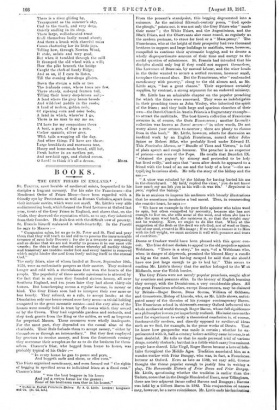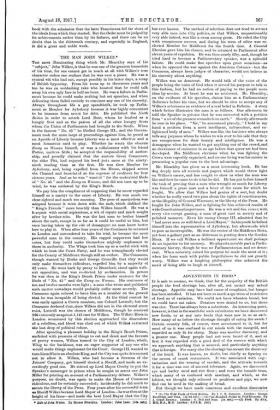BOOKS.
THE GREY FRIARS IN ENGLAND.. ST. Fcsucis, most lovable of mediaeval saints, bequeathed to his disciples a fragrant memory. For his sake the Franciscans—the Mendicant Order of Friars Album—have boon regarded with a friendly eye by Protestants as well as Roman Catholics, apart from their intrinsic merits, which wore not email. Mr. Little's very able and interesting book, which formed the Ford Lectures at Oxford last year, treats of the Grey Friars in England, and shows that, on the whole, they deserved the reputation which, as to say, they inherited from their founder. He deals find with the difficult vow of poverty. St. Francis himself embraced it whole-heatedly. In the Pioregi he says to Massoo
" Companion mine, lot us go to St. Peter and St. Paul and pray them that they will teach us and aid us to possess the immeasurable treasure of most holy Poverty ; for she is a treasure so surpassing and eo divine that we are not worthy to possess it in our most vile vessels ; for this is that- celestial virtue whereby all earthly things and transitory are.trodden under foot and every barrier is removed which might hinder the soul from freely uniting itself to the eternal God."
The early friars, nine of whom landed at Dover, September 10th, 1224, wore as enthusiastic paupers as their master. They endured hunger and cold with a cheerfulness that won the hearts of the people. The popularity of these ascetic missionaries is attested by the fact that in six years they founded sixteen houses, all over Southern England, and ten years later they had about thirty-six houses. But housekeeping moans a regular income, its money or kind. The Grey Friars soon had to interpret their vow more or less loosely. They. refused, as a rule, to accept lands ; at the Dissolution only one house owned over forty acres—a trivial holding compared to the great monastic estates—and the very sites of the houses were usually hold in trust by Mb towns which they served or by the Crown. They had vegetable gardens and orchards, and they took grants from the King or the nobles, as well as bequests for perpetual Masses. These resources wore wholly inadequate. For the most part, they depended on the- casual alms of the charitable. Their Rule forbade them to aoeept money, " either by themselves or through an intermediary." But they first employed lay proctors to receive money, and from the fourteenth century they overcame their scruples no far as to do the business for them- Solves. C'haucer's• friar, who begged from house to house, was probably typical of his Order :—
" In every house he flea to pours and prye, And boggeth melts and chase, or ellos cons."
The friars organized mendicancy; and even farmed out "the rights of begging in apecified areas to individual friars at a fixed rent." Chaucer's) friar " was the best beggere in his hosts; And yaf a certyn ferme for the in None of his bretheren cam ther m his haunt."
• Sada,. 511 Enerialt Franciscan Mager. BY t. B. LBO% Leaden: Magnum and Co, las. Oil. nctif
From the peasant's standpoint, this begging degenerated into a nuisance. As the satirical fifteenth-century poem, " God spode. the plough," points Out, it was not only the Grey Friars who " made their mone " ; the White Friars, and the Augustinian, and the Black Friars, and the Observants also came round, as regularly as the modem postman, to crave for food or a " Mass-permy." The Franciscans, who at the height of their prosperity had two thousand brethren to support and large buildings to maidtain, were, however, compelled to continue their systematic begging, and to devote a wholly diaproportionate amount of their time and energy to the sordid question of subsistence. St. Francis had intended that his disciples should only beg if they could. not support themselves, like Lawrence of Beauvais, by manual labour, and the wiser heads in the Order wanted to secure a settled revenue, however small, to replace the casual alms. But the Franciscans, who " confounded mendicancy with poverty;' clung to the old abuses and, as Mr. Little says, " lost a great chance." Their experience certainly supplies, by contrast, a strong argument for an endowed ministry.
Mr. Little has an admirable chapter on the popular preaching for which the friars were renowned. They were as indefatigable in their preaching tours as John Wesley, who inherited the spirit of the friars ; and they built large and spacious churches of their own—the Dutch Church in Austin Friara is a fragmentary example— to attract the multitude. The bolt-known collection of Franciscan sermons is, of course, the Carta Boonmerum ; another favoudts collection was known as Dormi securs—" in other words, Do not worry about your sermon to-morrow ; there are plenty to choose from in this book." Mr. Little, however, selects for discussion an inedited work by an English Franciscan, named- either Jelm Spitler or Robert Silke, who probably lived under Edward II. This Ruck:dos Moms, or " Bundle of Vices and Virtues," is full of plain speech and rough humour. The preacher is no respecter of persons—not even of the Pope. He recalls that Benedict IX. " obtained the papacy by simony and pretended to be holy but lived evilly," and says that "soon after death he appeared to a friend with the head of an ass and the body of a bear "—the ass typifying luxurious sloth. He tells the story of the bishop and the ass " A vicar was rebuked by the bishop for having buried. his acs in the churchyard. ' My lord,' replied the vicar, you do not know how much my ass loft you in his will—it was 403." Reguiescal its pace,' replied this bishop."
He is so anxious to impress Ids audience with homely illustrations that he sometimes inculcates a bad moral. Thus, in commending the contrite heart, he says:—
" We have an example in the poor little spinster who takes wool to spin, but often compelled by necessity, because she luta not enough to live on, she sells some of the wool, and when she lies to take the spun wool back, she moistens it, so that the weight may not be wanting. Now, ire ought to do like that. When at the suggestion of the flesh or the devil wo rob God, not of wool or linen, but of our soul, creatodin His image ; If we wish to restore it to Him with its full weight, we must moisten it well with penance and tears of contrition."
Donne or Crash aw would have been pleased with this queer. con- ceit. The friar did not disdainto appeal to the old prejudice against Welshmen. "There is a story," he says, "of a Welshman who, when in danger of shipwreck, promised the blessed Mary a candle as big as the mast, but having escaped he said that she should- have one just large enough to go to bed by." This. moms, to confirm Mr. Little's theory that Use author belonged to the Wait Midlands, near the Welsh border.
The Grey Friars were not merely popular preachers, sought after by courtiers and peasants alike. In the history of English learning they occupy, with the Dominicans, a very considerable place.. All the great Franciscan scholars, except Bonaventura, may be claimed by Britain—Roger Bacon, Duns Scotus, William of Ockham, and Grosseteste, Bishop of Lincoln, who, as Mr. Little shows, antici- pated many of the theories of his younger contemporary Bacon. The Franciscan school in thirteenthwentury Oxford influenced the whole mediaeval world through Roger Bacon, whose full significance as a philosopher is even yet imperfectly realized. His insistence on-tho need for experiment to-verify a theoretical conclusion is, of course, fundamentally modern, and directly opposed to mediaeval ideas such as wo find, for example, in the prose works of Dante. That he knew how gunpowder was made is certain ; whether he ex- perimented with it, half.a-contury before artillery mane into use, is at least doubtful. He tolls us that he made personal trial of various drugs, notably rhubarb ; but that is a foiblewhich many less eminent people have shared. Like Virgil, Roger Bacon became a hero of folks tales throughout the Middle Ages. Tradition associated him as a wonder-worker with Friar Bungay, who was, in fact, a Franciscan. lecturer at Oxford.. Even as late as 1588, we may add, Greene thought the theme popular enough to justify Trim in writing' a play, The Ifonouraele flierorie of Frier Been awl Friar Bungoy. Mr. Little, questioning whether the tradition is, earlier than the Tudors, notea thatiarise-Dengielituidred of Essex, near Tillinglians, there are two adjacent farms -called Bacons and Bungays ; B000ns• was held by a Gilbert Bacon in 1282. This conjunction of names May, however, be a more coinqidenco. Mr. Little ends hia:faminediag
book with the admission that the later Franciscans fell far short of the ideals from which they started. But the Order must be judged by its achievements rather than by its failures, and there can be no doubt that in the thirteenth century, and especially in England, it did a great and noble work.



























 Previous page
Previous page